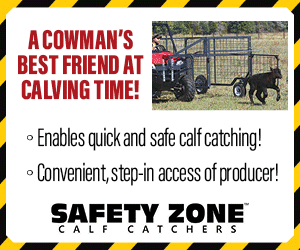Your Future As A Rangeland Manager

Range management encompasses a great many elements, from riparian area strategies to outdoor recreation management.
By: Loretta Sorensen
Students who consider the great outdoors to be the perfect office location may want to contemplate pursuit of a Range Management degree. Susan Edinger Marshall, Rangeland Resources and Wildland Soils professor at Humboldt State’s Forestry and Wildland Resources Department in Arcata, CA, says working as a Range Manager is all about plants and animals.
“Rangelands are part of a very fragile environment in the sense that they’re greatly influenced by events such as drought, fire, and major storms,” Marshall says. “Nature can wipe out with one event all the good management that land owners and range managers do to protect and support the land. That said, we still must do all we can to foster a healthy rangeland environment and learn as best we can how to prevent any further degradation of the rangeland ecosystem.”
Rangeland ecosystems throughout North America are comprised of vast grassland, shrubland, woodland and desert landscapes. Range managers typically work with both private landowners and public lands officials to integrate information about plant communities, soils, wildlife species, livestock use, watershed functions and land use policy to conserve and restore wildland ecosystems. Some career activities include invasive plant control, endangered species surveys or planning for a sustainable livestock operation.
Passion for working outdoors, desire to support healthy rangeland management activities and interest in interact ing with wildlife all fit well with rangeland management activities. In general, there is no “typical workday” in the industry. Managers work with hydrology, botany, ecology and wildlife.
Cambra Fields, from Pryor, OK, completed a Natural Resource Ecology and Management, Rangeland Ecology and Management degree. After graduation, she started working with USDA Natural Resources Conservation Service as a Rangeland Management Specialist. She’s pleased that her job allows her to help educate landowners and promote conservation.
“Through my job, I’ve been able to see my dad’s wetlands restored from a cropped floodplain into an excellent wildlife habitat,” Fields says. “I highly recommend pursuing your passion.”
Rangeland management jobs are commonly offered through the Federal Government, U.S. Forest Service, Bureau of Land Management, and Natural Resources Conservation Service. Graduates may also work in an academic setting as a professor or for a research organization such as Samuel Roberts Noble Foundation. Graduates also find job opportunities at the state level, working with publicly owned lands such as state department of agriculture lands, wildlife, parks or recreation.
Private landowners, ranches, ecological consulting firms, landscaping companies and tribal agencies also need the skills of rangeland managers.
HALF THE TIME IN THE FIELD
Degrees are offered in 18 U.S. states, as well as Canada and Mexico. Montana State’s undergraduate program gives students the opportunity to complete either a Natural Resources and Rangeland Ecology or Animal Sciences degree. Equine Horsemanship, Equine Science, Natural Resource Science & Management and Fish & Wildlife Science & Management courses are also available.
Their major focuses on managing the rangeland soilplant-animal complex, giving students an understanding of grazing and other land uses within a framework of total resource management. “In most rangeland jobs, you should expect to be in the field half the time and in the office the rest of the time, depending on the season,” Marshall shares.
“It’s important to have fundamental knowledge of plants and soils. In past analysis of successful range management graduates, we’ve seen distinctive markers indicating that students with an athletic background, those highly involved in service clubs and church affiliation like youth groups are the kinds of students attracted to range management positions. Students involved in Future Farmers of America (FFA) also make a good fit. Having an agricultural background isn’t a requirement for the degree, but it’s a big advantage to those students with that experience.”
If a graduate doesn’t immediately secure a rangeland management position, most degrees will also prepare them to work in a conservation capacity. “Just about every county in the United States retains a soil conservationist,” Marshall says. “If students don’t land their ideal job at first, there are still job opportunities.”

There are state-level job opportunities such as state department of agriculture lands, wildlife, parks or recreation.
The Western Undergraduate Exchange (WUE) assists students who seek a rangeland management degree outside their home state. Students residing in Alaska, Arizona, California, Colorado, Hawaii, Idaho, Montana, Nevada, New Mexico, North Dakota, Oregon, South Dakota, Utah, Washington and Wyoming are eligible to request a reduced tuition rate of 150% of resident tuition at participating two-year and four-year college programs outside their home state. Most programs are structured around a fouryear degree.
Many institutions limit the number of new WUE awards each academic year so interested students should apply early. More information is available at www.wiche.edu. A typical four-year program will include at least 18 semester hours of course work in range management, including courses in range plants, range ecology, range inventories and studies, range improvements and ranch or rangeland planning.
Other courses focus on plant, animal and soil sciences. Plant taxonomy, plant physiology and ecology, animal nutrition, livestock production and soil morphology are among the topic focuses. Management studies will involve resource management sources, such as wildlife, watershed, natural resource or agricultural economics. Students also study forestry, agronomy, forages and outdoor recreation management.
“Some graduates work with recreation restoration or control of ecological changes such as invasive weeds like knapweeds,” Marshall explains. “Some jobs will interface with several types of responsibilities such as use of public lands and permittee agreements.” The theme for the 2015 Society for Range Management annual conference is “Managing Diversity.” Among the conference topics are “Urban Open Space Grazing,” “Rangeland Analysis and Synthesis,” “Retaining Sage Grouse Habitat,” demonstration of new iPhone apps, and “Groundbreaking NonLethal Strategies for Minimizing Livestock Depredation,” illustrating the broad range of job activities encompassed in range management opportunities.
“Students don’t have to have an agricultural background to be a good fit in range management,” Marshall adds. “Some of my best students have come from urban areas but they have a strong interest in outdoor activities. The best way to decide if this is a good career fit is to review job abstracts. Current activities include working with sage grouse preservation, using social media to communicate to our audience and many other types of activities. It’s rewarding to work in this environment because soils support plants, plants support animals and animals support us. This is a highly relevant career choice.”
More information about Rangeland Management degrees and options is available at www.rangelandswest.org.


